Volta a la Comunitat Valenciana: The moments of pain and glory
From a first international win to an ill-timed puncture that settled the duel between a time trial specialist and a climber
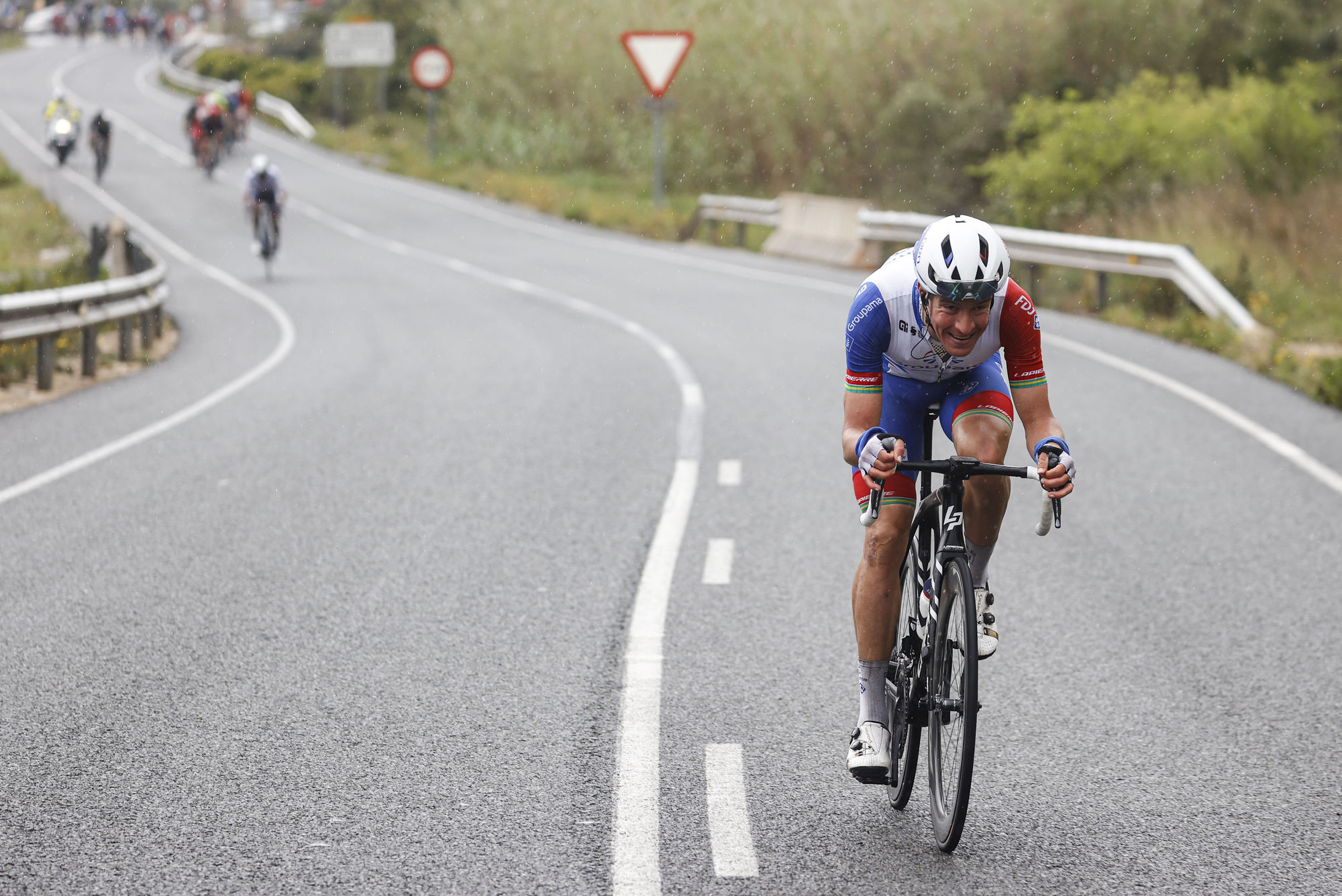
It is raining in Alicante and the men in a fractured peloton of the Volta a la Comunitat Valenciana are scared. Three category two climbs today, and they’re cresting the last of them and what comes after is terrifying.
Descending, like time trialing, is a specialist skill, though all riders know how to do it to some extent, competently enough to ride a bike for a living. However now, they’re all gripping the brakes, no longer feeling bold.
The roads in this part of Spain are beautiful, winding through the craggy limestone outcrops peppered with wiry, wind-swept foliage. Buildings, ancient, with terracotta roofs and taupe stucco walls line the ridges of the hills which are merciless. One look at the steel barrier standing between riders and peril and you instantly shrivel up at the inherent, intrusive thoughts that follow. It’s not the kind of place anyone would want to go fast in this kind of weather.
The rain’s been on and off. Sometimes, when the men round the corner, the camera captures the strange glow that permeates the liminal space between raining and not raining, not quite a sun-shower but not quite cloudy. Milky. Greige. Other times, droplets collect on the lens, a clear indicator of slickness.
At this point in the race, 22 kilometres to go, it’s hard to keep track of who’s where – they’ve been scattered all over the mountain sides – some lost on the climbs, others caught in the descents, none of them important enough to warrant a report. In fact, dare I say, it’s a rather weak field.
None of the three teams who podiumed last year are here currently and their spots have been filled by a variety of continental teams, who usually promise to make the race interesting with their spirited attacks and die hard breakaways. When everyone’s the scrappy underdog, however, things tend to stagnate. In this edition, only four of the fifteen teams are in the WorldTour – Movistar, Groupama-FDJ, Lotto Soudal, and Cofidis.
Where is everyone else, you might ask? Well, the Tour of Turkey is on at the same time, as is De Brabantse Pijl and Amstel Gold Race. Itzulia Basque Country was last week and next week marks the start of the Tour of the Alps, not to mention the Ardennes classics. Teams only have so many riders to spread around, after all.
Get The Leadout Newsletter
The latest race content, interviews, features, reviews and expert buying guides, direct to your inbox!
While races like this edition of the Volta a la Comunitat Valenciana may not be barn burners like Basque Country was, they do offer us small moments of pain and glory and their winners are always somewhat unexpected, if not exactly heroic.
The first two stages are puncheur stages, the third is the mountain stage, the fourth is a flat time trial and the final is a flat sprint stage. Races with this profile and a startlist of this composition are often won in the queen stage or the time trial, rarely before or after. This edition is no exception, but that doesn’t make it less worth writing about. Like I said, small moments of pain and glory.
Stage 1
Back to our skittish men in the peloton. The hills in this parcours are by means decisive and the whole thing could easily end up in a sprint – same with the stage 2. The climbs aren’t brutal enough to drop the sprinters nor are they long enough to whittle out the GC contenders from the rest of the bunch by means of sheer endurance, thus creating time gaps around which the rest of the race is oriented. They are, however, long enough to spice things up. The rain helps.
There’s a group of about twenty or so men in the peloton and they’ve gotten away on the descent, a naturally occurring gap by means of gravity and speed rather than deliberate attacks. Out front, a minute and a half ahead, a breakaway that’s caught not soon after. It looks as though our middle bunch is going to wait up for the stragglers. They look at each other, visibly slow. Stefan Küng (Groupama-FDJ) is there, as are some riders from Movistar, Cofidis, and representatives from most of the bigger ProTeams like Burgos-BH and Euskaltel-Euskadi.
It’s too big to work as a breakaway, but that’s fine, because two men don’t particularly feel like waiting for their companions to get organised. Miles Scotson (Groupama-FDJ) attacks with Abner González (Movistar) trying to follow but he never quite manages to snag the wheel. A crash behind into a corner disrupts the chase and Scotson, a time trialist at heart, puts his head down and commits.
He’s done this before, in fact, it’s how he managed to win the Australian National Championships in 2017 as a neo-pro. He hasn’t won since and he sees now as his chance. As far as strategies go, it’s a rather simple one: attack farther out than what would normally be considered reasonable when there’s chaos and then time trial it to the end. Hell, in a race like this, why not?
The rain is coming down sideways now, just as committed as Scotson is. A wet descent is not something for the faint of heart, but Scotson feels like trying his luck. He knows there’s only one little climb to go, and then it’s descents and flats – his territory. The visibility is low and every corner is treacherous but Scotson, it seems, isn’t slowing. He’s not a GC threat in the long run, and, skittish after being caught up in a crash and then put through their paces on a technical course, Scotson, to be frank, is just not worth the risk for the rest of the peloton. Besides, Scotson has Stefan Küng back in the chase to close down attacks, offering him additional insurance.
The roads are visibly slick, the rain stings the Australian’s eyes and the back of his bibs are a mess. The landscape turns lush and green under the veil of water. At 10 kilometres to go and Scotson has a lead of around 35 seconds. There are no more hills, no more descents. It’s just him, the rain, and the road. One looks at him riding among the mist and it’s hard not to shiver sympathetically. Movistar, arguably the strongest team in this race, leads the chase, but they’re being pestered by Küng in their wheel. It’s like riding on ice and the headlights of the neutral support car are reflected in the shiny surface of the road. The kilometres tick down, the gap grows – forty-eight seconds. The chase behind fails again after a crash on the exit of a roundabout. It’s almost certain that Scotson’s got this in the bag.
And then, with four kilometres to go, tragedy strikes. Scotson enters the traffic circle, glides his bike smoothly along the inner lane and all looks well until in an instant, the wheel loses grip and slips, sending him toppling to the ground. Adrenaline rushing in his veins, thinking only of the time, Scotson grabs the bike, checks his chain and gets back on as quickly as possible, as though he’s just tripped on the lip of a sidewalk. Nothing more than a temporary embarrassment.
When the camera zooms in on him, skin’s peeking through a tear in the Lycra on his upper thigh. He throws himself forward, lunges, does everything he can to get back into his cadence, tries not to panic. The whole ordeal cost him twenty seconds. Scotson pedals into the headwind, convinces himself not to look back.
The final kilometre. He grips his handlebars, grits his teeth, the peloton looms in the background, but they never catch up. Scotson, who has not won since his first and only win as a professional, crosses the line as the stage winner and the leader of this race. John Degenkolb of Lotto Soudal wins the bunch sprint behind.
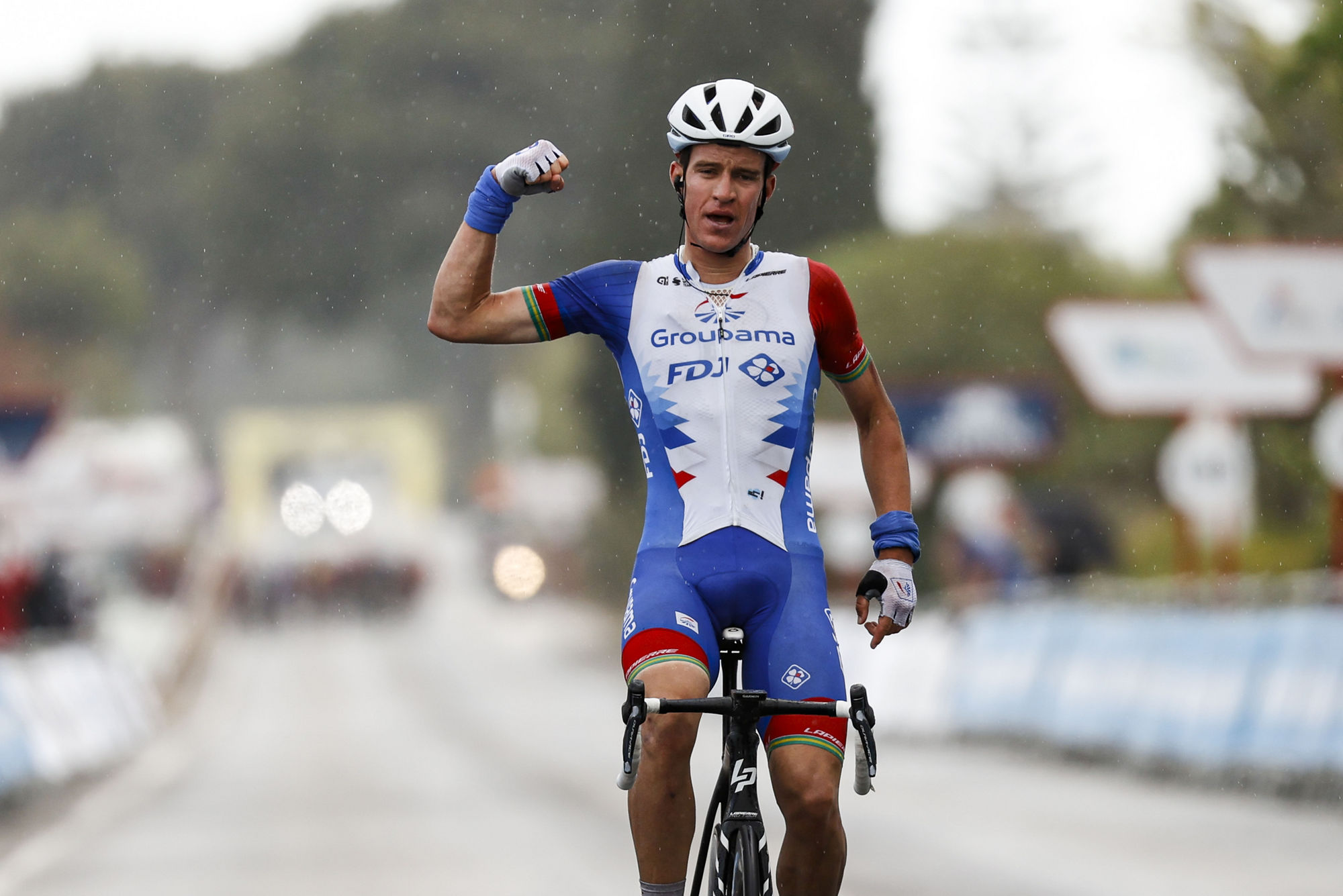
This is, of course, very good for Scotson, who has fulfilled one of the most beloved tropes in all of professional cycling: the leader who falls, gets up and still wins.
However, it puts Groupama-FDJ in a situation they did not anticipate, namely, having to defend the yellow jersey. You see, the French team did not come here with a general classification oriented team. They came here, essentially, with a sprint train for Arnaud Demaré, with Küng thrown in there as a cinch for the time trial stage. Not a bad tactic considering three of the five stages could theoretically end up in a bunch sprint.
Now, they don’t necessarily think Scotson can win this race – the queen stage will rip a rider like him to shreds. But, in defending, they’ve noticed something very important, namely that other teams are surprisingly weak. It doesn’t take a genius to figure out who the main threat is – Movistar, with Enric Mas, who’s podiumed in the Vuelta and has made it into the top five in a number of stage races. But Mas is a middling time trialist and if someone like Küng, one of the best time trialists in the peloton, can hold on in the mountains he’d be able to open up a time gap and use the strength of his team’s sprint train in the last stage to defend that gap. Theirs is a quiet strategy of limiting one’s losses rather than going on the offensive.
Stage 2
It is clear on the second day, when Scotson retains his GC lead and FDJ handily beats the others in the bunch sprint that they also have the strongest sprint train as well, which is surprising considering Caleb Ewan and Degenkolb are both in attendance for Lotto Soudal.
Now, Arnaud Demaré is nothing to scoff at as a sprinter – he pretty much dominated the flat stages of last year’s Giro d’Italia – but he’s been having a pretty slow season so far. Two second places – one in Paris-Nice and the other in Tour de la Provence – a win at La Roue Tourangelle and then abysmal finishes in every one day race he’s entered, not even making it to the end of the Scheldeprijs. As the kids say these days, Arnaud Demaré is down bad.
At four kilometres to go. It is pouring, and the heroic four-man breakaway that’s been out all day is caught just before the end of the race. They would have made it were it not for the men in the royal blue jerseys forming a line at the head of the bunch. By the last two kilometres, Groupama-FDJ is the only sprint train in color order and they are organised. It’s so wet that even Demaré, their fast man, still has his rain jacket on. Spray echoes around the tyres of the peloton as the pace increases feverously. Nobody can touch FDJ.
Küng’s time trialing at the front, Scotson behind him, Ramon Sinkeldam in third position, Jacopo Guarnieri in fourth, and then, Demaré. It’s a technical finish, the kind that suits Ewan more than the French national champion, but Ewan only has Degenkolb for company, and Demaré has an army. Ewan and Bingoal WB’s Timothy Dupont fight for Demaré’s wheel, for he is the man to beat, but Demaré is unconcerned. He is patient. He’s right to be so, for Guarnieri, as he moves off the front and drifts back through the peloton, holds Ewan back just long enough for Demaré to pip him at the line. FDJ wins handily, of course. That’s what they came here for, to win sprints with Demaré. The rest is just extra.
Stage 3
The queen stage and finally, a beautiful day. The sun is shining and the landscape is made extra verdant thanks to the rain. Three category three climbs outline the first half of the stage, followed by two category two climbs, including an uphill finish. This is not a day for the sprinters. It’s not really a day for the yellow-clad Scotson either, but when the cameras finally catch on to him at 31 kilometres to go, he’s not faring too shabbily, safely within the wheels of an already reduced peloton. Movistar, meanwhile, is at the front, working hard. They have to be. Today is their day, for in Nelson Oliveira and Enric Mas, they have two strong men with GC potential. However, neither is a particularly exceptional time trialist so they’ll have to put as much time as possible in between themselves and their competition in order to make up for whatever happens in tomorrow’s race of truth. It’s a numbers game.
Let’s be honest here, Mas is certainly the favourite to win this race. He’s by far the best climber in the bunch, has podiumed at a Grand Tour and has been top five in others. For him to not win in Valencia against a field this weak would be a little embarrassing.
His only real threats lie in his co-captain Oliveira, who’s working for him, and in Stefan Küng, the reigning European time trial champion. Küng’s not great on the hills, however he is phenomenal in a flat time trial like that of the key stage. He’s ridden smart so far by controlling the peloton in the last two stages, first to protect Scotson’s solo effort and second to lead out Demaré in his perfectly executed sprint. This has kept him up near the top of the pack in terms of time and he can easily take back at least a minute from Mas in the time trial tomorrow.
A minute is a lot of time in cycling. Küng and Mas are both gambling here. Mas is gambling that with Movistar’s war of attrition at the front, pushing the pace, Küng will be weary by the final climb, drop like a stone and lose at least a minute on GC. Küng is gambling that his legs will be strong enough to hold on and that Mas, who isn’t the worst time trial man in the peloton but who works significantly better under pressure, won’t have the necessary advantage to hold off Küng. After the time trial there’s only a sprint stage left and without the climbs to separate the weak from the strong, this race will ultimately be determined in the time trial. Hence, there’s a lot riding on the only hilly stage.
When Mas first attacks with 27 kilometres to go, it’s uncertain whether or not he’s panicking a little bit because he’s running out of teammates or if he’s just seen the day’s breakaway come back into view and wants to be ahead of the inevitable brouhaha that erupts in such a situation. Regardless, he tucks his lithe little body into the drops and surges forward. Küng, who is guarding Scotson, is stuck between a rock and a hard place – he wants to go after Mas but he’s got a responsibility to uphold, not to mention Mas has company from Euskaltel, Caja Rural and two members of Cofidis up front, none of whom want the Spaniard to win.
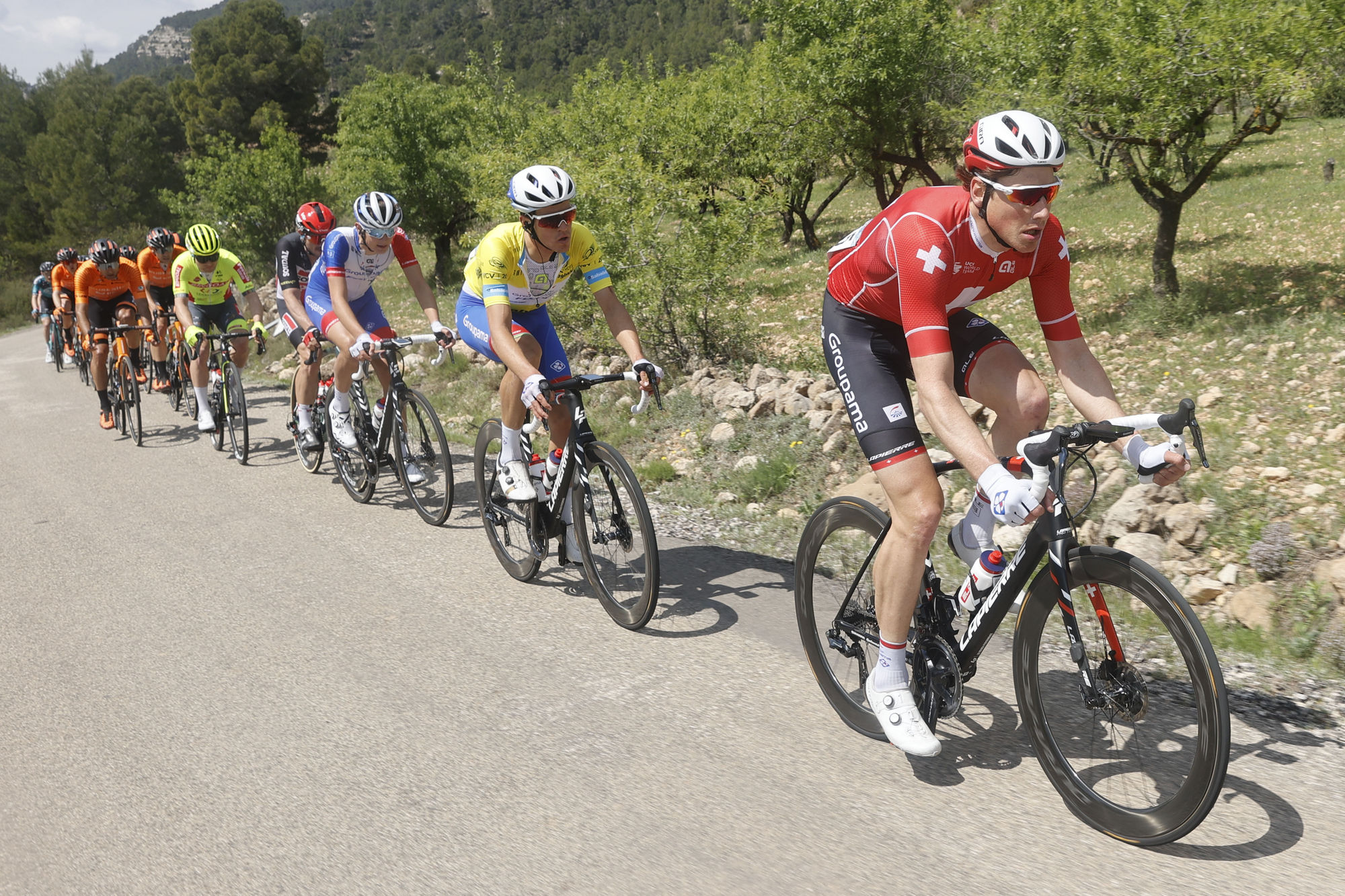
The gap they’ve pulled is more like a sliver. Küng is smart to wait and not commit himself too much. That’s been the FDJ strategy so far: patience. Scotson, however, is dropped in the surge and Küng gets the okay to go ahead, towing Oliveira with him. The climb winds its way up the rocky, brush-laden hills, its pale roads now dry but no less harrowing and steep. The gap remains small. Mas doesn’t look like he can go all in on this attack. It’s not necessarily a failure because they’ve managed to drop Scotson and isolate Küng from all of his men – but it’s a double edged sword. Mas is isolated as well and Küng is no longer beholden to anyone.
Scotson’s only lost 24 seconds to the rest of the pack, but he’s tired himself out and he’ll need to rest up for the time trial tomorrow and his role in the sprint train the day after that. His GC hopes, sorry to say, are over. Still, to win a stage after so many years of racing without victory and to wear the yellow jersey three out of the five days of a stage race is reward enough. That’s something lovely all on its own.
Küng is a fine descender and he makes use of gravity and the front group’s slightest hesitations in order to catch up to them before the final climb. So much for Mas’ attempt at separation, but the good news is that Oliveira has had time to recover and has rejoined him.
There’s silence between the men as they concentrate on guiding their spindly machines around narrow hairpins peppered with sweet, humble villas carved into hillsides. A lesson learned on these paths is that beauty can also be treacherous. Freewheels buzz, a motorbike passes, captures the tight-lipped expression of Mas who is thinking, thinking, doing the math in his head. What do I need to do? He looks behind and sees the stoic face of Stefan Küng.
They turn a corner and the rolling hills covered in dense but low profile foliage emerge into walls of sublime massive stone lined by wispy trees. Ruins line them. Oliveira is working on the front, Mas tucked into his wheel, protected from the wind.
It’s not just Küng Mas has to get rid of. Rémy Rochas and Victor Lafay from Cofidis are only a few seconds behind him in GC, so is Elie Gesbert from Arkéa-Samsic. Their game of attrition hurts everyone, but paradoxically, it helps them as well – the speed may be high, but all the other men have to do is stay in each other’s slipstream. It’s Oliveira’s job to bear the brunt of the elements. He does so with dignity. For over ten kilometres, he labours, his body rocking gently from side to side, the person behind him changing with the gradient of the terrain and Oliveira lets them rotate, like a changing of the guard. He only looks forward.
At four kilometres to go. They start to look around. Attacks pop off at the front of the bunch. Euskaltel’s Martin, Cofidis’ Rochas, neither of whom succeed, but the injections of pace are hard on a rider like Küng whose legs favour long steady efforts. Oliveira fights hard to head off the surges, even opening up a little bit of daylight while doing so. He’s the MVP of the day, and his act of sacrifice for his charge is perhaps one of the defining acts of this race.
It’s Gesbert and Lafay who make the stage winning move at three kilometres to go, throwing their bodies forward on the final climb of the day, spinning a high cadence, both teams desperate for a win in what is a mostly dry season for them. Mas merely follows – his time to work has not yet come. They’ve got a sliver of time on the others. Oliveira simply lets Küng press on behind – why not? Go wear yourself out Stefan and if you get too close I’m always here to come up and slow you down.
Luis Angel Maté from Euskaltel-Euskadi manages to bridge the gap, a herculean effort on his part. A Spanish team wants to win Spanish races, after all. For Küng now it is a game of steeled nerves. He can’t let this get to him. All he has to do is limit his losses. As long as a minute is all that separates them, he can manage, he can survive. Two kilometres to go. No one is going to help Küng – he’s the man to beat and all of them except Remy Mertz from Bingoal have teammates up front. This is a time trial with others in attendance. Oliveira watches all of them with wary eyes.
Flamme rouge, the final kilometre and the gradient escalates to nine per cent. Just as they fly under the red kite, Mas goes. He’s impatient. His companions manage to hang on, however, and he abandons the manoeuvre. Best to try again, closer to the line. They’re anxious, looking at each other. Who’s going to have a dig next? It could be any of you. Maté, who has spent so much energy just trying to reach this front group, is the first to drop. Pity. He was the underdog of the four. Lafay, the rider from Cofidis, who has not yet won a race as a professional, replaces Maté in this role. Gesbert is doing everything he can to shake the other two off. He doesn’t want it to come down to a sprint, but Mas seems to have recovered enough when Oliveira was working for him in order to make up the difference with every little jolt.
It all comes down to the bonus seconds, the GC is that close. So much is on the line. Lafay gives everything, his head lolling about and for a moment he surges ahead of Mas, dropping Gesbert in the meantime, but it’s not enough. Mas kicks off, flies by easily and snatches the stage, all smiles as he does so.
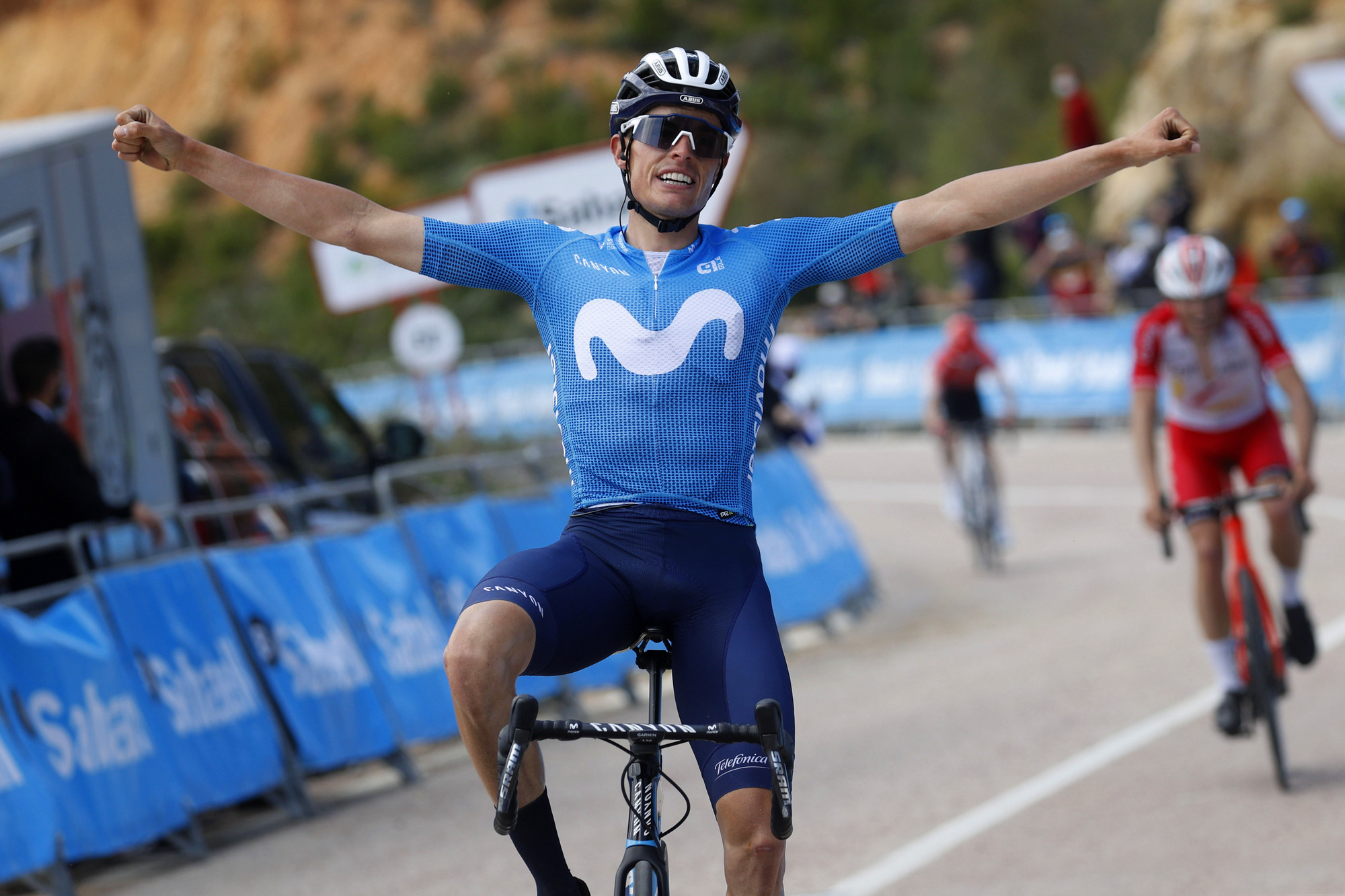
Now it’s time to wait and see how long it takes Küng to cross the line. The wait is cruel. Ten, twenty, thirty, forty seconds pass. With bonuses, it’s fifty-one. A tall order for tomorrow but still under a minute. It looks as though Mas has this in the bag. He’s all smiles, embraces Oliveira, who’s worked so hard for him before entering the tent. He’s got a yellow jersey to change into.
Stage 4
Cycling is a beautiful sport full of moments, like Miles Scotson’s in the first stage, of uplifting glory. It boasts narratives of perseverance, teamwork, self-sacrifice, and total commitment. But it is, at times a cruel sport, an anti-climactic sport, a somewhat unfair sport.
Such is the case with the fourth stage of Valenciana, the time trial, the race of truth. Time trialing is every bit as much mental as it is physical. It is difficult to be all alone on the road with just yourself, the rhythms of your body, the bicycle and the road. You are judged in the most naked way possible against the actions of others. Expectations are high, the pressure is immense. In a way, it is quiet, intimate racing. Personal. Existential.
Let’s not pretend that this race is between anyone other than three men: Mas, Oliveira, and Küng, the first two being teammates. But in a time trial, one only rides for oneself. Küng is one of the finest time trialists in the current professional peloton and the current European champion – but he’s got a lot of time to make up if he wants to contest this race, which ultimately ends here, The final stage is more of a formality than anything else, a day for the sprinters.
The weight on this man’s broad shoulders is heavy and unrelenting, but he’s used to this sort of thing. That’s what being a time trialist is all about. Oliveira, for his part, knows this well. He’s the former Portuguese national time trial champion and nothing to scoff at. The pressure is less intense for him because, at this moment, he’s still Movistar’s back up plan. That leaves Mas. He isn’t a bad time trialist, but he’s nothing to write home about. He’s not going to beat Küng in the stage, no way, no how. For him, the stage is all about limiting his losses. He’s got almost a minute on the Swiss rider, that should be enough. Should be.
The weather is forgiving once more and the clock ticks by as one rider after another goes off the start ramp. If you’re high up in the GC there’s an awful lot of time to waste dwelling on things before it’s your turn to ride. Weaker men would find this torturous, but these men are used to it – they let it roll through them like breath.
What Stefan Küng does on a time trial bike is architectural. The low arch of the back, the stillness of the torso as powerful thighs act as pistons to turn over pedals, his head down, everything in its proper place. We are witnessing a perfectionist at work. The camera zooms in, shows us the rise and fall of Küng’s breathing, calm, collected, managed, in through the nose, out through parted lips. He is the very picture of focus, riding a bicycle and committing his entire body and mind to doing so. That commitment is visual.
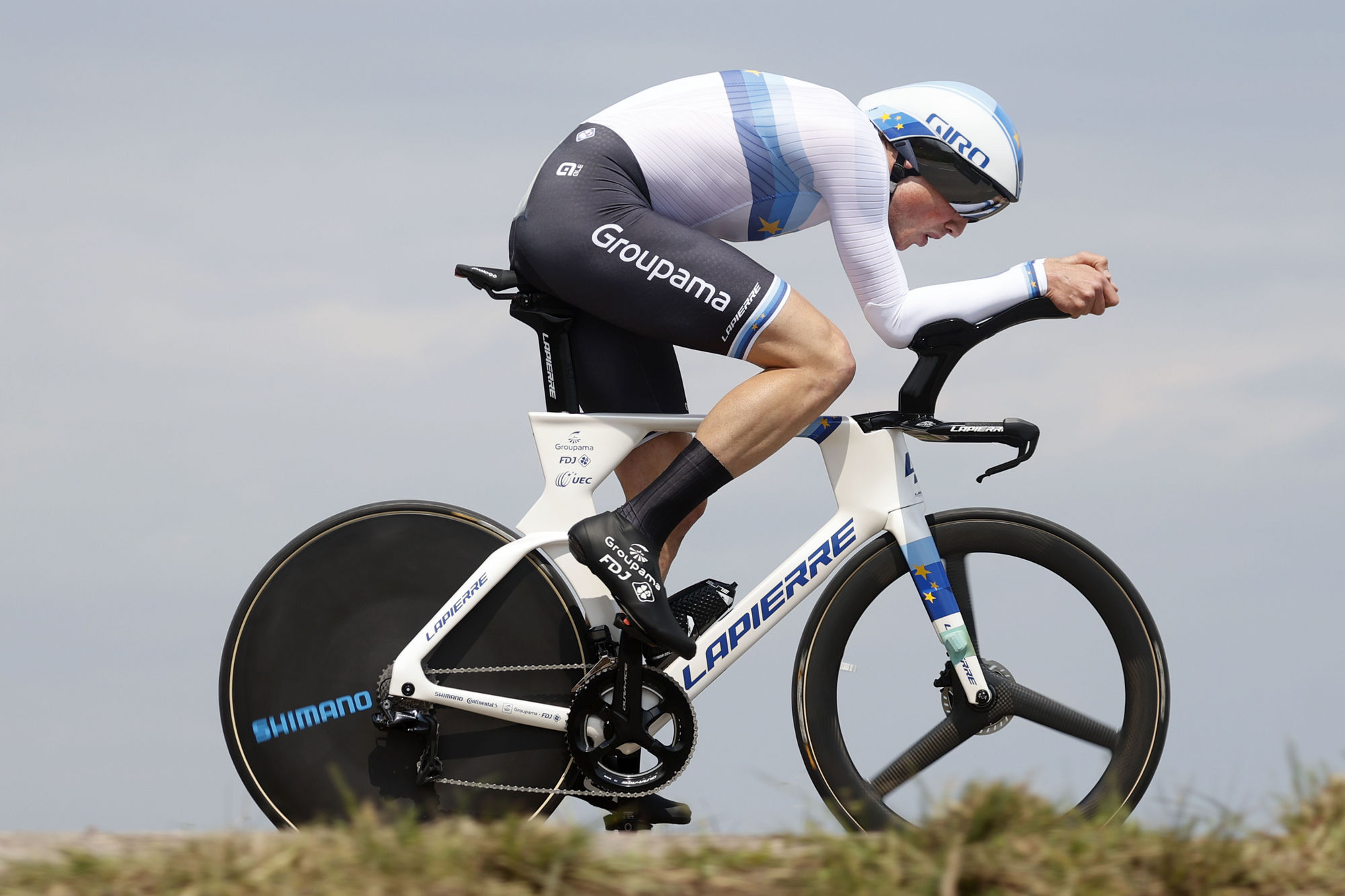
Oliveira waits patiently on the start ramp, adjusts his space-age helmet, blinks a couple of times. Oliveira’s only 46 seconds down on GC. This is just as much his race as it is Mas’. He is a deserving opponent, one Küng, the favorite of this stage, probably fears most because he knows Oliveria will not lose that much time. When he launches off the ramp he inhales sharply as though he’s about to dive from a very tall height. Palms line streets, contrasting with the long sleeves of their skinsuits. They only ever look straight ahead, however. Any distraction and that’s enough to snag seconds in a race that comes down to just that. When the helicopter passes over them they are lonely on the streets with no spectators to cheer them. The rolling hills and cypresses lining the roads, make a lovely blur for the men counting their heartbeats and emptying their lungs.
At the intermediate time check, Küng is already up 30 seconds on the current stage leader, Arkea’s Thibault Guernalec. Six seconds behind Küng, Oliveira.
Mas takes the plunge on the ramp. He’s the underdog now, despite being the race leader. How the tables turn so quickly. Mas isn’t comfortable on the time trail bike. He wiggles his torso, shifts his hands around on the aero bars, gets into the bullhorns when the corners arrive, not trusting the natural lean of his body. Still, he pedals, still he drives on. Küng, however, crosses the line no fewer than 39 seconds ahead of the rest, a spectacular display of dominance. So much for Mas’ minute. One kilometre left for Oliveira, who, in the end concedes only ten seconds to Küng.
Now, we wait for Mas. Twenty-one seconds down at the intermediate Mas gives everything, absolutely everything, rollicking about, tongue out. The cameraman follows him relentlessly as the commentators talk about how he hasn’t quite lived up to his expectations. It’s a rather sad situation, but there’s still hope – there’s still thirty seconds. That’s ages in cycling. Hands on the bullhorns, he’s nervous now, breaking the aero position in order to jaunt up a short hill. Climber’s habit. The flamme rouge in the distance and for now it looks like Mas is going to squeak by, barely, but the margin is razor thin.
It all comes down to every single sliver of time. One shift into the wrong gear, one movement of the hands to an inopportune position, one relaxation of the cadence and it’s over.
17:03 is the time Mas needs to hold Küng off. He has a minute to finish the final 1000 metres. A minute. It’s close, so close, and then, disaster strikes. A high-pitched squeal is heard and the camera shifts to Mas’ gritted teeth. His legs slow. He’s punctured. In the final five hundred metres of the time trial, he’s gotten a flat tyre.
Just like that, it’s over.
Stage 5
Let me tell you what happens after that. It’s dull really, though the setup is exciting, for Oliveira is only 6 seconds down on Küng in the overall after stage 4. On a good day, he could exact revenge for his teammate, pip him at the line for the GC.
A bunch sprint, however, is a chaotic environment – it’s hard to get organised among all those lead out trains with men pulling off left and right at terrifying speeds. In the final stage, Demaré smokes Caja Rural’s Jon Aberasturi and Bingoal’s Timothy Dupont in a bunch sprint, thanks to the strength of his lead out team, including Scotson, who, for all his trials and tribulations finishes ninth in the general classification.
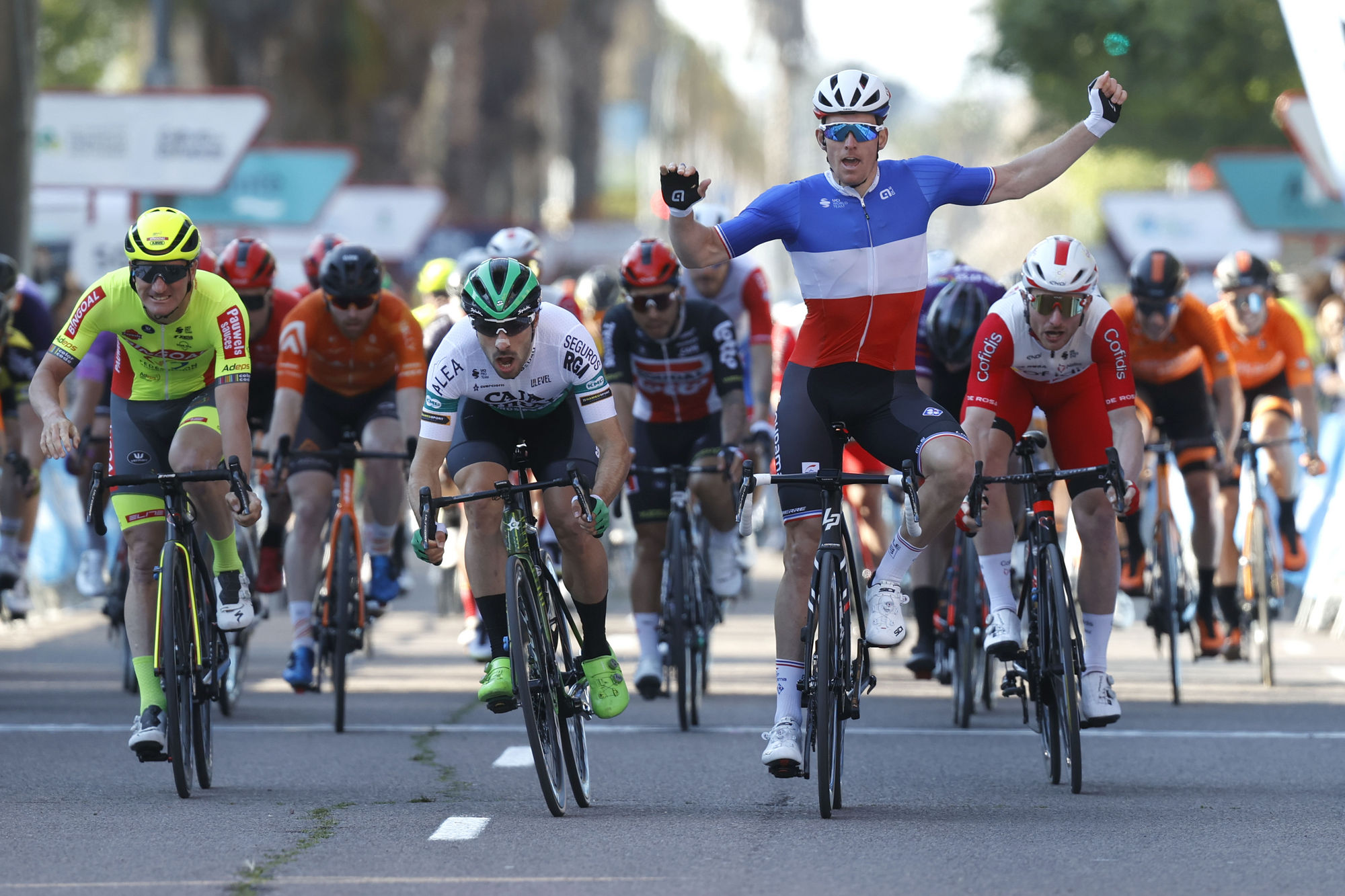
Mas manages to end up third overall, behind his teammate. That he is beaten by a time trial specialist who came here as part of a sprint train and then by his own road captain has to be a sore spot for the Spaniard.
It always hurts to lose on your home turf. The worst part is there is nothing Mas could have done differently. It all came down to bad luck, plain and simple.
The lesson to be learned from Valenciana is that sport is glorious and cruelty is part of that glory.
We must remember that the original definition of the sublime came from the pen of the philosopher Edmund Burke who used it to describe both the majesty of the Alps and the violence of the French Revolution alike. Cycling is like that, too.
Kate Wagner is a Chicago-based writer and critic. Her work on cycling can be found in various publications including Procycling. Her newsletter covers cycling in an unconventional fashion, featuring essays, short stories, multimedia works and illustration.
She can be found Tweeting at @derailleurkate